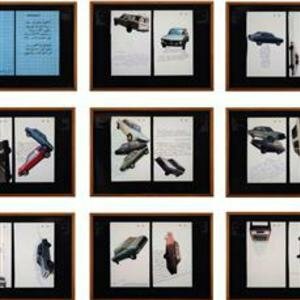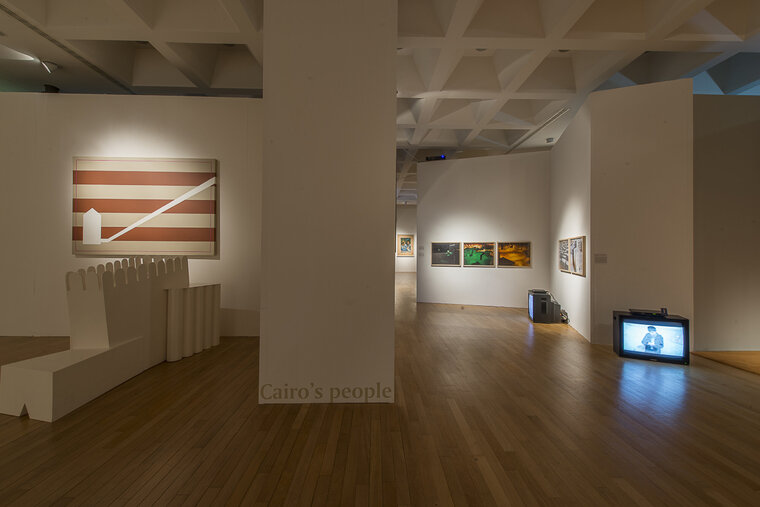


Last updated on Thu 22 January, 2015


curated by Marco Scotini
Pinacoteca Nazionale di Bologna
January 22 – April 12, 2015
Following the success of last year's exhibition The Empty Pedestal on the former Soviet bloc, the 2015
programme of Arte Fiera Collectors’ World now features the most far-reaching exhibition ever held in Italy on
the Middle East art scene: Too Early, Too Late. Middle East and Modernity. Curated by Marco Scotini, the
show will present almost 60 artists, more than 100 works - on loan from Italy's most prestigious private
collections - and historic documents to examine how this part of the world relates to Western modernity and
how it narrates the story of its own complex social structure in a ‘cultural area’ undergoing a sea change.
Too Early, Too Late will be staged in the temporary exhibition area of Bologna’s Pinacoteca Nazionale
(National Art Gallery) but will also spill over into spaces occupied by the gallery’s magnificent collection of
14th century artists (from Vitale da Bologna through to the late Gothic schools). This is a reminder that
Bologna, “the Learned”, was, with Paris, Oxford, Avignon and Salamanca, one of the five cities in which the
Council of Vienne of 1312 decided to set up faculties of Arabic, Hebrew and Syriac, laying the basis for
Oriental studies in the Christian West.
But it was in 1798 with the arrival in Egypt of Napoleon's army of exploration that modern Western thought
burst in upon Muslim thinking.
The exhibition alternates documentary evidence - including original archival material - with installations,
photographs and film footage illustrating many fundamental cultural, political and social episodes that
marked the progressive Westernisation of the Eastern world - from the introduction of the ‘nation state’ to the
spectacular, Western-style museums of the Arab Emirates. By showing the historic background and
spanning a broad timeframe through many narratives, the exhibition allows visitors to put more recent
cultural and artistic production into perspective.
In light of the area’s current urgent geopolitical situation, the exhibition Too Early, Too Late tries, through
the prism of art, to examine the commonly held beliefs that have down the years underpinned both the clash
but also the dialogue in this area between traditional systems and western-style modernity.
“With the collapse of the Soviet Union”, writes the exhibition’s curator Marco Scotini, “the two bloc system of
the Cold War seems to have been replaced by a new dichotomy - between Islam and the West. By the same
token, the void left by the alternative to capitalism seems to have been filled by nationalist, ethnic and
religious identities. The former ‘political’ stand-off seems to have been replaced by a ‘conflict of civilisations’
based on a range of political systems whose cultural traditions range from the archaic to the advanced, each
with their own idea of modernity (al-hadatha).”
The term Middle East sums up a European geopolitical concept and was coined by a British newspaper at
the turn of the previous century. Although still used widely, today, however, it denotes a theoretical concept
rather than an actual geographical region. Too Early, Too Late uses the term to represent an area that
extends to North Africa, the Caucasus and Central Asia, especially since today’s centre of gravity is tending
to shift from the Arab world towards Turkey and Iran: from Egypt to Iraq and Saudi Arabia, and from
Azerbaijan to the edges of Kazakhstan and Afghanistan. Indeed Turkey and Istanbul are central features of
the exhibition, their geographical position making them the gateway to the East, something that was
reinforced politically with the advent of the Ataturk Republic in1924.
The curator has not attempted with this Exhibition to record or rewrite history, even a broad spectrum of
momentous events are considered. Nor is there any attempt to sum up with hindsight the visual and linguistic
codes used in the West to represent the Middle East. Too Early, Too Late tries to reconstruct the story of
when the West encountered the Muslim world. With its focus on the contemporary art scene, it adopts a
specific ‘topographic viewpoint’ from which to observe this area, developing a series of linked themes that
together make up the overall discourse of the exhibition.
Exhibits include rare pieces like the only remaining copy of the film footage of Tel al Zaatar (1977) and the
“Taccuino Persiano” by Michel Foucault written for the newspaper Corriere della Sera on the pro-Komeini
uprising in Teheran (1979).
The title of the Exhibition, Too Early, Too Late, echoes Jean-Marie Straub and Danièle Huillet’s 1981 film
on Egypt Trop tôt/Trop tard that puts historic events into a quite different perspective. A true masterpiece,
the film looks at the peasant uprisings in France in 1789 and in Egypt in 1952. Shifting from the Breton
countryside to rural Egypt, in the first half a voice-off reads a letter by Engels to Karl Kautsky dated 1897 in
which he considers what the French Revolution has left behind. In the second part, the commentator reads a
passage of the postscript of the book La lutte des classes en Egypt de 1945 à 1968 by two Arab writers who
published under the pseudonym Mahmoud Hussein (Maspero, 1969). Throughout the film the two directors
constantly searched the horizon of the deserted Egyptian countryside for an ideal point between sky and
earth where Engels could have said: “if the 1793 Commune with its aspirations of fraternity came too early,
Babeuf, for his part, came too late”.
Serge Daney’s description of the film as one of the few that have tried to film the wind could also be the
metaphor for this second exhibition. In the first, The Empty Pedestal, the invisible force - something that is
there but cannot be seen - was the spectre or ghost. Here, it is the wind that in the Straub-Huillet film shakes
the trees, first in the French then in the Egyptian countryside. It is the wind of revolutionary that overturns the
established order. In the compacted space and time of an exhibition, Too Early, Too Late takes a new look
at the Middle East – a Western colonial concept – and proposes a different narrative, one of dominion and
emancipation.
The exhibition will be accompanied by a volume edited by Mousse Publishing. As well as an interview with
Jean-Marie Straub on the film that gives its title to the project, the book includes numerous contributions on
how they see the West, an essay by Hamadi Redissi and a critique by the exhibition curator Marco Scotini.
The exhibition has been made possible thanks to the curatorial consultancy given by Lorenzo Paini and the
loans of artworks generously offered by major private Italian collections, especially Fondazione Sandretto Re
Rebaudengo, Collezione Enea Righi, Collezione La Gaia di Torino,
Fondazione Giuliani, Fondazione Fotografia Modena, Collezione Agiverona, Collezione Palmigiano,
Fondazione Nomas, Fondazione Videoinsight.
Artists:
Lida Abdul, Mustafa Abu Ali, Bisan Abu Eisheh, Etel Adnan, Vyacheslav Akhunov, Can Altay, Omar
Amiralay, Ayreen Anastas, Said Atabekov, Kutlug Ataman, Fikret Atay, Kader Attia, Vahap Avsar,
Mahmoud Bakhshi, Gabriele Basilico, Neil Beloufa, CANAN, Céline Condorelli, Dina Danish, Cem
Dinlenmiş, Peter Friedl, Rene Gabri, Sadhi Ghadirian, Yervan Gianikian -Angela Ricci Lucchi, Barbad
Golshiri, Mona Hatoum, Malak Helmy, Emily Jacir, Khaled Jarrar, Lamia Joreige, Alimjan Jorobaev,
Hiwa K., Hassan Khan, Abbas Kiarostami, Taus Makhacheva, Mona Marzouk, Ahmed Mater, Sabah
Naim, Moataz Nasr, Navid Nuur, Walid Raad, Koka Ramishvili, Hany Rashed, Mario Rizzi, Ahmed
Sabry, Roy Samaha, Hrair Sarkissian, Ariel Schlesinger, Hassan Sharif, Wael Shawky, Ahlam Shibli,
Eyal Sivan, Jean Marie Straub-Danièle Huillet, Jinoos Taghizadeh, Lawrence Weiner, Mohanad
Yaqubi, Amir Yatziv, Akram Zaatari.
Join us in our endless discovery of modern and contemporary Arab art